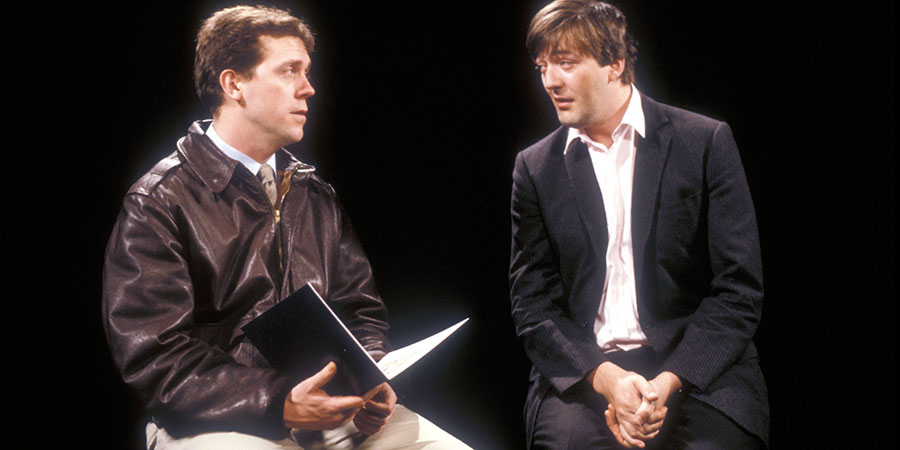Two sides to every character

Dave Cohen continues to look at how to define sitcom characters...
"There's two sides to every story" is one of those great clichés of writing that deserves more serious examination.
I'm sure it applies across all genres, but I only know about comedy, where so much of what we write hinges on the difference between how characters see themselves, and how the audience see them. All of us have a number of character traits and these are usually covered by a broad spectrum, but "two sides" is a simple shorthand way of getting us to pronounce those traits in a more extreme form.
In a movie, or a novel, there is time to explore the spectrum, and the complexity of who characters are and why they behave in a certain way. In sitcom you have less than half an hour, more like 22 minutes if you're working for anyone apart from the BBC, to tell a complex and satisfying story about your main character or characters.
Whatever you're creating, the quicker you can arrive at the funniest part of what sits at the heart of your character the better.
Buy a word book thingy

When you're creating a new person, a good place to start is your copy of Roget's Thesaurus. Buy the book, cheapskate, it's so much more satisfying than the online version, and it helps broaden your vocabulary in the process, although proceed with caution with regard to verbosity, loquaciousness and, like, using too many word thingies where you can get away with not using too many word thingies.
If you have a rough idea about the kind of person you want your character to be, it will be helpful to look up a key word you might use to describe them, and see where this takes you. For this experiment, I've looked up the word "rigorous". It comes in a block of words headed by "accurate", and includes the definitions "precise, exact, detailed, meticulous, scrupulous" and even "perfect". Nothing too bad yet about this person, wouldn't you say? However, included in that same small block of definitions are the following words: "pedantic, hair-splitting, nit-picking."
Already you can start to create a picture of this new character. They see themselves as thorough individuals with a sharp eye for detail and an ability to arrive at the correct answer. You and I see them as the kind of irritating, controlling perfectionists who make our lives a misery, when they're not annoying the hell out of us.
Who is Jez? Who is Mark?

It's fun to look at some of our favourite comedy characters, and find two words that describe them which essentially mean the same thing, but offer a positive and negative side.
If Jez from Peep Show was asked to describe himself in one word, he might well come up with "spontaneous". And that's not a bad word to describe him, suggesting excitement, curiosity, and a willingness to take the initiative.
Ask Mark to describe Jez in a word though, and he would probably call his flatmate "impulsive". It's a similar word, but is probably far more accurate, and gives us more insight into the brilliant stories that follow in each episode, suggesting reckless, selfish, thoughtless, rash, foolish, hair-brained... okay I'll put the thesaurus down now.
In real life most people are not so extreme, but this is not real life, it's fiction. All that's required is an element of believability, and familiarity. We've all known someone like that in our lives.
The most powerful person in the country

If you want to see the extremes of personality in action, look no further than the on-going story of our daily news. For a politics nerd like me, studying the parallels between sitcom characters and Members of Parliament is a fascinating experience. Do you remember that in early 2017, everybody loved Prime Minister Theresa May? Loved so much, and much more than her party, that everyone thought it would be a good idea to run an election campaign based entirely on her personality.
Along the way, it was decided there were two aspects to her personality that could be defined as the essence of a great politician. In these volatile times, what people wanted to see more than anything was strength and stability. Mrs May, the story went, possessed huge amounts of both of these marvelous characteristics. Right up to the point that she didn't.
Within days the story had changed. Theresa May was weak and unstable. Look, everyone! See how she twitches when she's asked a difficult question! Look at all the times she shakes her head before she answers! Watch the strong and stable backdrop literally come crashing down behind her.
She carried on for two years as the permanently damaged leader of a permanently damaged party. Every new test was proof that she was utterly useless. And this is where our Theresa May sitcom begins. She is still in charge of the country, just. She still turns up for work every day. She gets up in the morning, looks at herself in the mirror, and says "I'm strong and stable". At which point the mirror wobbles and falls off the cupboard, narrowly avoiding slicing off her big toe.
She goes to the market to buy a pound of apples. The shopkeeper charges her £10, she tries to haggle and ends up paying £11.50. See how it's possible for a person to think they're one thing, for the rest of us to see that they're exactly the opposite - and for both groups to be right.
Theresa May did, after all, retain all the trappings of the job - meeting the Queen, living in Downing Street, going to Chequers at the weekend, putting on her tin helmet and getting to play serious leader in the underground bunker when a big incident happened. It's just that in the sitcom we're watching everyone was playing along with the pretense. And we could all see it happening. Like Yes Prime Minister, except every time that phrase was uttered with deep sarcasm. Wish I'd spoken to a commissioner at the time. Sadly, real life beat me to it and replaced her with a comedy monster and, sadly for me, he's writing his own sitcom in real time. Oh well, back to the drawing board.
For more articles on defining characters, see BCG Pro's Inside Track Library
This article is provided for free as part of BCG Pro.
Subscribe now for exclusive features, insight, learning materials, opportunities and other services for comedy creators.



